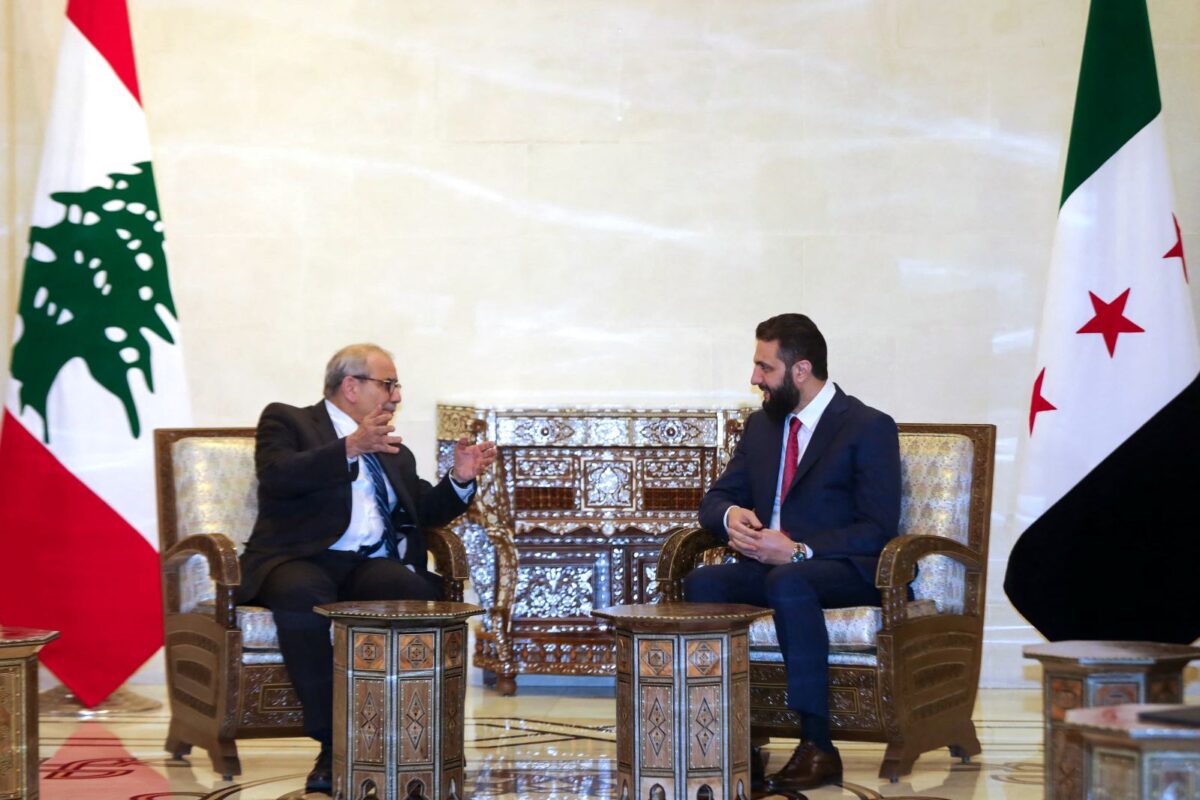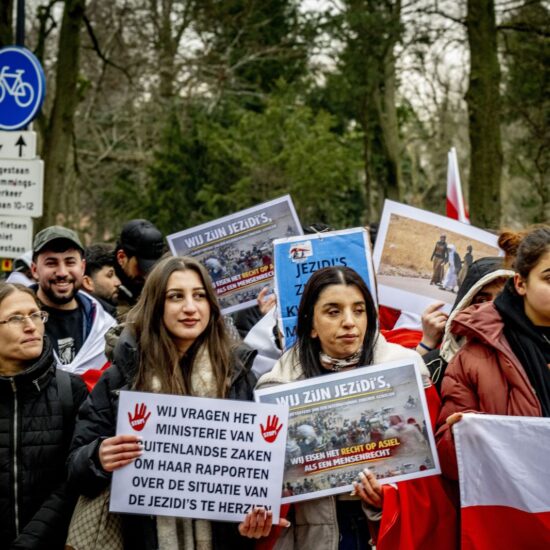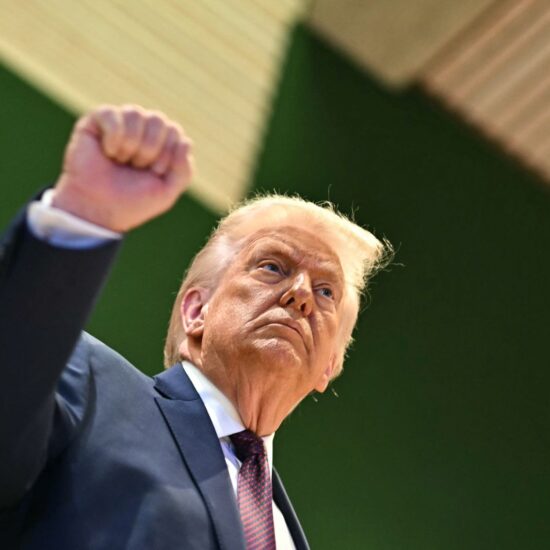
During last Sunday’s briefing to a delegation of Arab media representatives, Syria's interim President Ahmad al-Sharaa has positioned himself equidistant from all Lebanese parties, surprisingly offering a hand to Lebanon and a hand to Hezbollah. But a few claims cannot reassure the neighboring country from the previously-stated threats of annexation and economic sanctions
“We have made concessions regarding the wounds that Hezbollah inflicted on Syria, and we chose not to continue the fight after the liberation of Damascus.” These remarks from Syrian President Ahmad al-Sharaa during a 20-minute briefing to a delegation of Arab media representatives on Sunday, August 24, are unprecedented. “There can be no river of fire, nor geographic curse between the two neighbors,” he went on saying, marking a shift not only in his relationship to Lebanon – that so far he showed little interest in restoring ties with, despite both Najib Mikati and Nawaf Salam’s visits to Damascus – but, more surprisingly, in that with the Iran-backed Hezbollah, close ally of the former regime of Bashar al-Assad, and drastically weakened by the assassination of its former leader, Hassan Nasrallah, during its recent war with Israel.
On Sunday, Sharaa sought to reassure audiences about his intentions toward the group. “Some portray us as terrorists and an existential threat, while others want to use the new Syria to settle scores with Hezbollah. We are neither one nor the other,” Sharaa stated. He added that the Sunni-majority cities of “Tripoli and Beirut, as well as certain Christian regions, would have welcomed a Syrian intervention against Hezbollah.” He even asserted that Syria “had the right to do so, after everything Hezbollah has done,” and that such an operation would have received international approval. “But it would have been a minefield, and what we want is a return to stability in our region,” he claimed.
In 2013, when Hezbollah formally declared its military involvement in Syria to support Bashar al-Assad and secure the continued flow of supply routes into Lebanon, it justified it by claiming that it was fighting the takfirists, Sunni Islamist rebels that present a threat to the Shiite community: a fear that proved to be partially grounded when a series of terrorist attacks carried out by ISIS and Jabhat al-Nusra – an affiliate formation of al-Qaeda that Ahmad al-Sharaa himself, previously known as Al-Julani, was the leader of – started to hit Lebanon, with suicide bombings, cross-border shelling’s, shootings and car bombs, that between 2013 and 2017 killed around 250 Lebanese, 170 of whom civilians, and wounded thousands.
Since the takeover on December 8 by a rebel coalition led by the Islamist group Hay’at Tahrir al-Sham (HTS) – itself a formation from Jabhat al-Nusra -, at the peak of the advance started the day after the formal ceasefire with Israel on November 27, the pro-Iranian party has been losing ground both politically and militarily, while Syria continues to announce seizures of munitions bound for Lebanon. In early July, Hezbollah’s new leader Naim Qassem commented on the fall of the Assad regime, saying that “what happened was certainly a loss for the Axis of Resistance, because Syria was a path of military support” – not to mention that the Shiite group feels now encircled by both Israel and Syria, especially following the Israeli army’s capture of the Syrian village of Rakhleh, just a few kilometers from the Masnaa crossing.
The Lebanese party also claims that the new Syrian government, which it considers to be emanating from radical Sunnism, is not trustworthy when it comes to protecting minorities, as the massacres committed by fighters affiliated with the new authorities against members of the Alawite and Druze communities – and sporadic attacks against the Syrian Christian minority – have shown. Moreover, rumors have circulated in recent months about a possible territorial deal that would cede a large part of the occupied Syrian Golan Heights to Israel in exchange for the annexation of Tripoli, the major Sunni city in northern Lebanon, and its surroundings to Syria – as threatened by US envoy Tom Barrack last July, with a statement that sparked controversies.
The arbiter and the black sheep
It is difficult to say what kind of reassurance such threats can offer: not only because for the Lebanese in the north, the Syrian occupation is still a painful memory; nor because until eight years ago, people were being blown up by organizations affiliated with the current government. But also because, still reeling from a devastating war with Israel, Lebanon – internally fractured on the issue of disarmament – appears as the black sheep of the negotiations, while its Syrian neighbor stands as the arbiter, shaking hands with both Turkish and Western powers which, having weakened the Iran-led Axis, are now imposing a new pax in the Middle East, with a redrawing of borders that has never been so close to realizing the dream of a Greater Israel.
Yet far from being credible, al-Sharaa’s arbitration is affected by extremely delicate internal issues: the separatist push of the Kurds and the Druze, a new Alawite exodus, the uncontrolled use of weapons by government-affiliated militias, and an Israeli occupation that continues to advance.
For the man once known as Al-Julani, unaccustomed to suits and ties and the formality of handshakes, solving these challenges requires a broad diplomatic backing, particularly from the United States and key Arab countries: a role, that of the region’s stabilizing force, once played by Hafez al-Assad, who back in the 1970s was also counting on US support. This shift is evident in al-Sharaa’s recent efforts to distance himself from the Muslim Brotherhood and from the 2011 uprisings, which he now claims not to represent. He’s also exploring a potential security arrangement with Israel and taking steps to curb Iran’s access to the broader Middle East – considering especially its proximity to Israel – a strategy that hinges on tighter coordination with Beirut. Now backed by strong international support and the promise of economic recovery, the Syrian President may be aiming to build a form of soft power in a Lebanon weakened and impoverished by years of crisis.
The price to benefit from Syria’s rebirth
Addressing the media delegation, the Syrian leader spoke at length about economic relations with Lebanon. According to him, Lebanon “must benefit from Syria’s rebirth, otherwise it will lose a great deal,” affirming his desire for a “state-to-state relationship with Lebanon, based on economic solutions, stability and mutual interest.”
The economy has been in fact a central theme in his speech, and could serve as Syria’s new gateway into Lebanon’s affairs. Talking to the delegation of Arab press, al-Sharaa seemed to be proposing a mutual benefit arrangement to the neighboring country: settling long-standing bilateral disputes in return for preferential entry into Syria’s economic landscape. This offer coincides with the early stages of Syria’s reconstruction, driven by large-scale – albeit possibly impractical – development plans. Despite earlier expectations that Lebanon might play a pivotal role in them, it has largely been left out of these initiatives so far. A visit of a high-level technical delegation representing the Syrian Ministries of Foreign Affairs and Justice, as well as security agencies, should be scheduled for next week: possibly paving the way for greater cooperation and the eventual visit of Syrian ministers, including Foreign Minister Assaad Shaibani, who had been expected in Beirut since June, and has allegedly postponed his tour due to security concerns.
In the meantime, the Syrian delegation is expected to present Damascus’s now well-known demands: resolving the issue of Syrian nationals held – often without trial – in Lebanese prisons, particularly those detained for supporting the revolution. Stuck in a decade-old legal limbo, in fact, after the fall of the Assad regime, hundreds of Syrian detainees in Lebanon have experienced for the first time the possible hope to be released from the country’s most infamous prisons. Having threatened to retaliate with diplomatic and economic measures against Lebanon over the prisons’ demand – including freezing some security and economic channels, closing land crossings, imposing restrictions on the passage of Lebanese trucks, or reconsidering joint border security cooperation -, al-Sharaa seems to consider the Islamist detainees’ file as a real existential issue. An issue which, however politicised it may be in the current debate, remains first and foremost a humanitarian one.
At the same time, the Syrian delegation will review other issues, among them the organization of entry and exit mechanisms for Syrian citizens in Lebanon and the improvement of their treatment, often characterized by harassment and mistreatment. It is also pushing to address mass arrest operations targeting individuals lacking legal documentation or those who entered Lebanon unlawfully, along with enhancing joint border control to curb the flow of weapons and narcotics.
As part of these talks, the Syrian delegation is expected to bring up the formal demarcation of the border – a step seen as key to reinforcing long-term security coordination. Once these core issues are resolved, both sides are reportedly preparing to enter a new phase in their relationship, which could include the restoration of diplomatic ties, the exchange of ambassadors, and discussions on joint commercial ventures. These projects may open the door for Lebanon to benefit from trade and transit routes, as well as from potential cooperation in the energy and oil sectors: but at a price.








